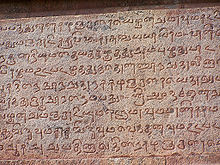Official language
An official language is a language that has special status in a country or other organization. Usually, the government does its business in the official language. They are sometimes named in a country's constitution.


Some countries, like Switzerland and Luxembourg, have more than one official language. Other countries, such as the United States and Australia, may not have a de jure official language set by law, but they may have one or more national languages that is considered de facto official because it is used by the government and people in the country.
An official language does not have to be a written language. It can be a pidgin language (like in Papua New Guinea), or a sign language (like in New Zealand).
De jure, de facto, and minority languages
changeA de jure language is a language that is officially recognized by the government. For example, Persian is the de jure language of Tajikistan. However, a de facto language is a language that is generally accepted as the official language but has no legal status. For example, English is a de facto language of the United States as it has no official status. Other languages are not generally accepted as the official language, but are recognized as languages commonly spoken in the region. For example, Irish is a minority language of Great Britain, as it does not have official status but is commonly spoken there.